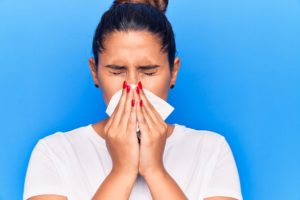Allergies in February?
 If you are suffering from allergy symptoms and you live in the Washington, DC, Northern Virginia, and Maryland metropolitan area, you are not alone. There may be many reasons why this is so. You should understand that there are a variety of allergens that could be affecting you, even in February. We will discuss some of them below.
If you are suffering from allergy symptoms and you live in the Washington, DC, Northern Virginia, and Maryland metropolitan area, you are not alone. There may be many reasons why this is so. You should understand that there are a variety of allergens that could be affecting you, even in February. We will discuss some of them below.
It should be noted that dust allergy is an allergy that occurs throughout the year. Dust is always present no matter how clean you are. In fact, it is not typically the dust particles that you often see in the air near a well-lit window that is the culprit in someone with dust allergies. It is the dust mites that are primarily responsible for causing the annoying symptoms in a dust-allergic individual. Dust mites are arachnids like spiders and ticks. They are microscopic and live off of the dead skin that sloughs off all individuals. A dust-allergic individual is actually allergic to the dust mite’s feces as well as its exoskeleton. The 2 common species of dust mites in the U.S. are Dermatophagoides farinae (i.e., American house dust mite) and Dermatophagoides pteronyssinus (i.e., European house dust mite). Both species are responsible for causing or contributing to both allergic rhinitis (i.e., hay fever) and asthma. The classic symptoms of allergic rhinitis may include sneezing, nasal congestion, runny nose, post-nasal drip, itchy nose, itchy throat, sinus congestion, sinus pressure, sinus pain, headaches, snoring, itchy eyes, watery eyes, puffy eyes, and/or redness of the eyes. Asthma symptoms, on the other hand, may include wheezing, chest tightness, coughing, and/or shortness of breath. Even though dust is a perennial allergen, it can worse for some individuals in the Winter, when a house is generally more closed up compared with the other seasons.
Mold is another perennial allergen that is bothersome to many individuals with allergic rhinitis and/or asthma. Although molds tend to be present in every season, they tend to be more abundant in the Fall, when leaves fall off of the trees and sit on the wet ground. This setting is perfect for molds as the moisture is a catalyst for mold growth. It should be noted that Washington, DC was built on a swamp and is thus is a great environment for molds to grow. Many individuals who live in the Washington, DC metro area are bothered by this abundance of mold and as a result suffer more than they would have if located in a different part of the country. Mold, just like dust, can cause or aggravate both allergic rhinitis and/or asthma. Mold-sensitive individuals may complain of runny nose, nasal congestion, post-nasal drip, itchy nose, itchy throat, sinus headaches, snoring, sinus pressure, sinus congestion, sinus pain, watery eyes, itchy eyes, redness of the eyes, swelling of the eyes, chest tightness, wheezing, coughing, and/or shortness of breath depending on whether they exhibit allergic rhinitis symptoms, asthma symptoms, or both. In addition, there are conditions like allergic bronchopulmonary aspergillosis (ABPA) and allergic fungal sinusitis that occur because of an allergy to molds where an inflammatory reaction ensues. These 2 disorders are more involved than that of the standard allergic rhinitis situation, thus requiring more specialized tests and more complex treatments in the diagnosis and management of these conditions.
Lastly, when one thinks about allergies in the month of February, one must think of tree pollen. In the metro Washington, DC area, trees begin to pollinate earlier than they have done even 10 years ago. In the past, trees would typically begin to pollinate in late February. In the last few years however, we have seen pollination begin in early February! This early tree pollination is what accounts for the earlier symptoms of hay fever felt by allergy sufferers in the Washington, DC area. Tree pollen also causes or aggravates both asthma and/or allergic rhinitis. Again, tree-sensitive individuals may experience nasal congestion, post-nasal drip, runny nose, sneezing, itchy nose, itchy throat, itchy eyes, watery eyes, puffy eyes, redness of the eyes, snoring, sinus pain, headaches, sinus congestion, sinus pressure, coughing, chest tightness, wheezing, and/or shortness of breath depending on whether they have asthma symptoms, allergic rhinitis symptoms, or both.
It must be stated that many allergy sufferers are allergic to more than one of these allergens (i.e., allergic to dust, molds, and tree pollen), and thus may exhibit far worse symptoms than if they were allergic to only one or two of them. In these individuals with multiple allergen sensitivity, they will most likely have allergy symptoms for much longer than the month of February or even one season. They usually have allergic rhinitis and/or asthma symptoms throughout the year.
The board certified allergists at Black and Kletz Allergy have over 50 years of experience in diagnosing and treating allergic rhinitis, asthma, immunologic disorders, and all other types of allergies. We treat both adult and pediatric patients. Black & Kletz Allergy has 3 convenient locations with on-site parking located in Washington, DC, McLean, VA (Tysons Corner, VA), and Manassas, VA. The Washington, DC and McLean, VA offices are Metro accessible and we offer a free shuttle that runs between the McLean, VA office and the Spring Hill metro station on the silver line. To schedule an appointment, please call any of our offices or you may click Request an Appointment and we will respond within 24 hours by the next business day. We have been servicing the greater Washington, DC metropolitan area for many decades and we look forward to providing you with state-of-the-art allergy and asthma care in a friendly and pleasant environment.

 Many parents wonder at what age can children be skin tested for allergies?
Many parents wonder at what age can children be skin tested for allergies?